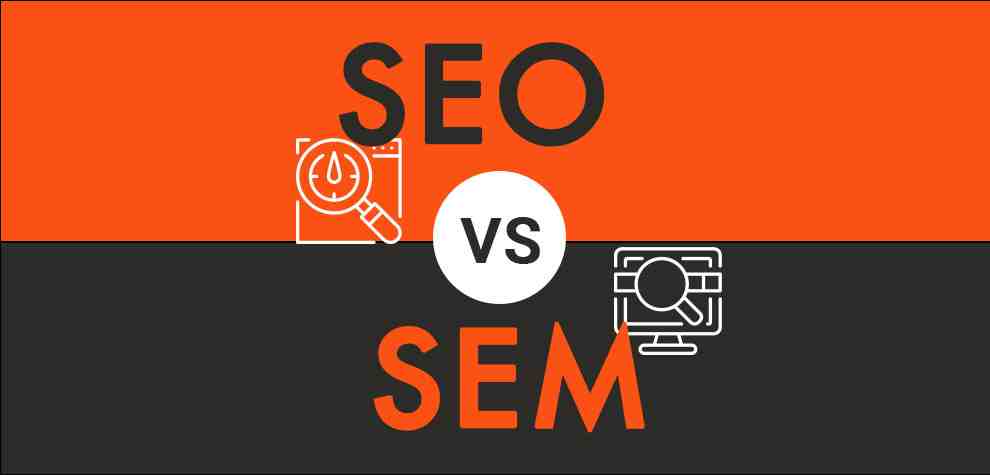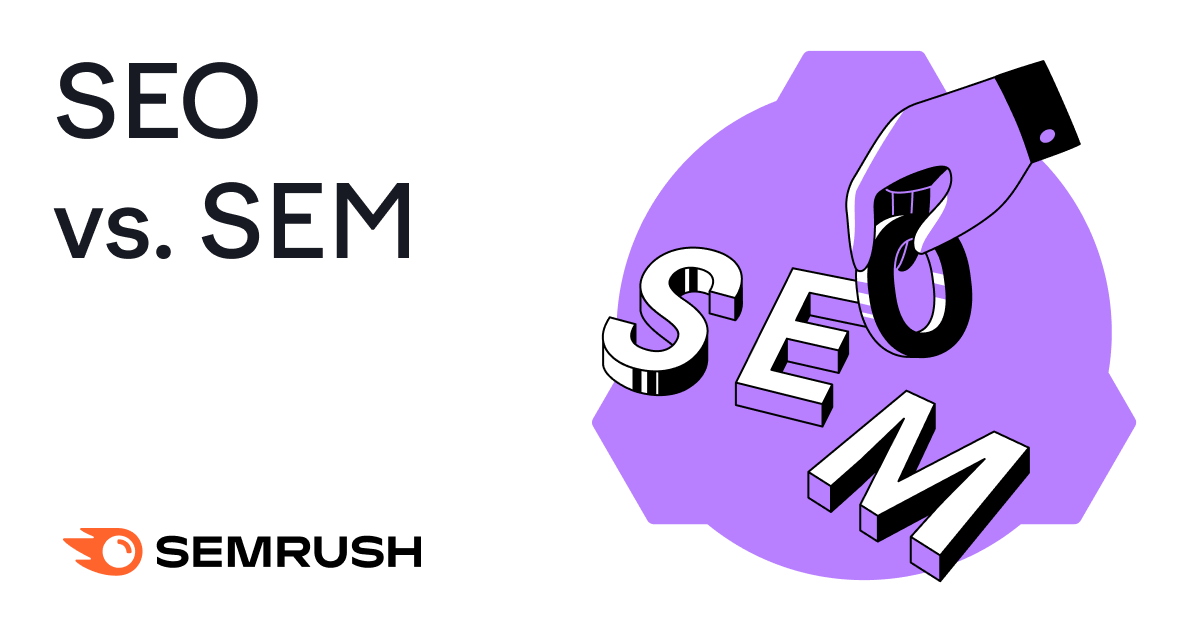Perhaps the only field that uses more acronyms and initializations than web marketing is the military.
The military uses it to save time.
Sometimes, it seems like our industry is just using it to confuse newcomers.
And it’s not uncommon for even experienced professionals to mix it up.
Some of the most common mistakes occur when it comes to concepts that are similar and related, but very different from search engine optimization (SEO) and search engine marketing (SEM).
Long ago, in the quiet days of the early internet (i.e., circa 2001), SEO referred to a subset of SEM.
However, as the language and nuances of web marketing shifted, search engine marketing referred to a specific type of digital marketing. So, what’s the difference?
Also sometimes referred to as organic (SEO) and inorganic (SEM) search, both focus on using Google (and to a lesser extent other search engines) to drive traffic to specific websites.
From a high-level view (and don’t worry, we’ll get into details later), SEO is the process of improving your website to generate traffic, while SEM uses paid methods to show up in searches.
Don’t feel bad if you mix up these terms. It happens all the time.
To help you avoid embarrassing accidents when talking to other digital marketers, we’ve put together this handy guide to give you an overview of these concepts.
Confused? No, it will all become clear in the end. Now let’s get started.
PPC, Another Variable In The Mix
As we get started, just to make things even more confusing, let’s add one more initialization to the mix: PPC or pay per click.
Okay, that’s not really fair because PPC is just another term for SEM – or at least, part of it.
PPC is most likely a term that evolved through the Wild West days of early search engine strategy when different people used different terms to refer to the same thing.
Finally, pay per click and search engine marketing mean the same thing: paid digital marketing advertising on search platforms.
Pay per click, regardless of whether it is called PPC, CPC (i.e. cost per click), paid search, or search advertising refers to paid search marketing, usually through search engines such as Google and Bing.
Other terms and tactics used in digital marketing initiatives – especially those related to search marketing tactics (both paid and organic) – may not be so simple and clear.
What’s The Difference Between SEO & SEM/PPC?

We know SEO is search engine optimization.
However, marketers don’t optimize for search engines. We optimize content and websites for search engines (as well as humans), so that they can better understand, access, and direct searchers to our website.
Again, initialism doesn’t always make sense. So, of course, this is a bit illogical.
Just like with other things in life that don’t always match, there are some acronyms that will never make sense either.
Like the Humvee, which doesn’t represent any word that starts with a U or E in it. (It actually stands for High Mobility Multipurpose Wheeled Vehicle, and comes from its original acronym, HMMWV.)
We’ve also determined that PPC marketing is (at least now) the same or a large part of SEM. This is where they overlap:
But, while Wikipedia defines SEM as “a form of internet marketing that involves the promotion of a website by increasing its visibility on search engine results pages (SERPs) primarily through paid advertising,” it is not so quick to call it the exact same thing.
In fact, pay-per-click marketing has its own Wikipedia page that is separate from search engine marketing (though there is a lot of difference and confusion across the pages).
And, while PPC is typically the largest and most demanding component of SEM, both PPC and SEM are paid initiatives that offer real-time data, ROI, and protected data that only advertisers on certain platforms can access.
Why It Matters

Consistency is the main reason it is important to clarify these terms.
Too many novice marketers, or marketers who are not experts at maximizing value through search, have adopted this industry definition and crossed it out, combined it, confused it, or used it in ways that undermined its true meaning.
And even experienced marketers who disagree with or perhaps even fully understand the term itself help contribute to the backflow as well.
Conference has set up a whole segment of their educational offerings around the SEM naming convention when it comes to strictly paid marketing efforts, but those efforts aren’t entirely through search engines.
SEM, at least from this perspective, includes PPC advertising on search engines but also on third-party platforms like Amazon and YouTube, as well as industry-focused platforms like Houzz, Thumbtack, or Yelp. It also includes display advertising and remarketing efforts.
And, as opportunities for advertising on social media continue to grow, it is commonly used to refer to paid advertising on those networks as well.
Here at Search Engine Journal, we do our part. Keeping the definition and usage consistent will be the best way to keep the information organized in a way that makes sense to marketers.
It also helps us, as marketers, to convey our thoughts and ideas to clients and interested stakeholders, colleagues or friends about what we actually do for a living.
However, you should never assume that the other person knows what you mean when you use this term.
Be brief and explain exactly what you are talking about and make sure everyone agrees with the definition of the term.
Before we move on, let’s recap:
Now that we’re out of the way, let’s move on.
Should I Use SEO Or SEM?

Now that you hopefully understand the difference between SEO and SEM, you must be asking yourself: Which one should I use?
But if you don’t have the bandwidth and can only choose one, here are a few things to consider:
What Are Your Goals?
If you want to drive traffic quickly, whether to promote sales, try out new offers, or simply give your website more exposure, SEM is the choice for you.
SEO, on the other hand, is a marathon, not a sprint. It takes more time to show results but is good for long term growth and compounding value.
What Is Your Budget?
Obviously, SEM campaigns will cost you money. After all, there’s a reason it’s called pay-per-click.
If your budget is limited or you have low product margins, running SEM might not make sense.
SEO, on the other hand, is more of a time investment than a financial one. And, you may be able to enlist people already on your payroll such as writers, IT personnel, and marketers for help.
How Is Your Site Currently Performing?
If your website is already ranking highly for your keywords, your SEO needs will primarily be driven by changes to Google’s algorithms and competition.
In this situation, SEM is a great augmentation. On the other hand, if you’re not getting a lot of organic traffic, you may need to set up SEO before you start spending money on paid advertising.
How Much Data Do You Have Or Need About Visitors?
SEM allows you to capture more visitor data than organic search.
You can run your PPC campaigns through dashboards like Google Analytics, where you can see clicks, impressions, CTR, sessions, conversions, etc.
You can then use this data to track trends and attract new customers.
How Is Your Online Reputation?
SEO is a great way to control the narrative around your brand.
Using the same techniques you use to climb to the top of search rankings, you can control how your organization is seen online.
In one famous (though unsuccessful) example, UC-Davis paid a consulting firm $175,000 to clean the internet of negative posts.
Of course, if you can swing it, you should combine SEO and SEM as a complementary search strategy.
This way, you can use the data you collect from your PPC campaigns to improve your SEO campaigns. This will give you a better idea of what your audience is really looking for when they click on your link, so you can tailor your content accordingly.
Combining the two practices also allows you to create remarketing campaigns.
If your SEO work is driving visitors, but you’re not seeing the conversions you want, you can use SEM to actively reach those targets and bring them back to your website.
Pairing SEO and SEM can also allow you to completely dominate search engine results pages (SERPs).
If you have a top ranking on the first page of results, plus a paid listing on the same page, you’ve just claimed a lot of real estate.
The downside of this, however, is that your paid listings can deprive you of your organic traffic, costing you unnecessarily.
Conclusion

Hopefully, at this point, we have managed to impress you with the differences between SEO and SEM. But just in case it’s not clear, here’s one more time for the folks behind:
SEO uses non-paid tactics to drive traffic to your website organically. This is a slower process (usually three to six months) but can pay dividends in the long term.
SEM, including PPC, is the use of paid search platforms to drive targeted traffic to your website. This requires a budget but can drive results very quickly.
Too many people see these as the same thing or as completely separate initiatives and miss the benefits of using them together.
To get the best results, both should be part of your digital marketing strategy.
They each have different strengths and weaknesses, but when put together properly, can give you a real competitive advantage.
Featured Image: Krakenimages.com/Shutterstock
Which of the following are types of SEO?
6 types of SEO you need to increase your site traffic
- On-page SEO. This is the type of SEO that you are probably already familiar with. …
- Off-page SEO. Defining off-page SEO is a bit more difficult. …
- Technical SEO. …
- local SEO. …
- App store optimization. …
- YouTube SEO.
Which of the following is a 2-point type of SEO? Your search engine optimization strategy can be divided into two distinct categories: on-page SEO and off-page SEO.
What is SEO explain the difference between SEO and SEM?
The main difference is that Search Engine Optimization (SEO) is focused on optimizing websites to get traffic from organic search results. On the other hand, the goal of Search Engine Marketing (SEM) is to get traffic and visibility from organic and paid searches.
What does the term SEO mean? Search engine optimization (SEO) is the practice of leading your website to rank higher on search engine results pages (SERPs) so that you receive more traffic. The goal is usually to rank on the first page of Google results for the search terms that mean the most to your target audience.
What is difference between SEO & SEM?
SEO is sometimes used as a general term that includes SEM, but because SEM refers to paid advertising, they are actually separate. SEM is about getting traffic through paid advertising, and SEO is more about acquiring, monitoring and analyzing organic (unpaid) traffic patterns.
Is Google a SEO or SEM?
SEO (search engine optimization) refers to the practice of improving your website to perform better on search engines like Google. SEM (search engine marketing) refers to marketing activities involving search engines, such as SEO and pay per click (PPC), local listings on search engines, and more.
Which is better SEO or SEM?
SEM is a brilliant choice if you want fast results. You can actually show ads to your target audience within hours. SEO, on the other hand, takes more time. But SEO provides sustainable long term payoff for revenue growth.
What is difference between SEO and SEM Mcq?
16. What is the generally accepted difference between SEO and SEM? SEO tends to be a west coast term, sem is more east coast.
What is the main difference between SEM and SEO?
The main difference between SEO and SEM is this: SEO is free and relies on an organic search strategy, whereas SEM comes at a cost and relies on paid advertising. Also, SEO takes time to implement, whereas SEM is instant.
What is difference between SEO and SEM Mcq?
16. What is the generally accepted difference between SEO and SEM? SEO tends to be a west coast term, sem is more east coast.
What is the generally accepted difference between SEO and SEM co3 *?
SEO tends to be a West coast term, SEM is more East coast.
What is SEO Mcq?
| A | None |
|---|---|
| D | Search Engine Optimization |
What is SEO and SEM and how it works?
SEO is search engine optimization that works to increase website visibility and generate organic views. SEM is search engine marketing which also increases the visibility of websites using advertisements, and website owners have to pay according to the number of clicks on their website advertisements.
What is the main difference between SEM and SEO?
The main difference between SEO and SEM is this: SEO is free and relies on an organic search strategy, whereas SEM comes at a cost and relies on paid advertising. Also, SEO takes time to implement, whereas SEM is instant.
Is Google a SEO or SEM?
SEO (search engine optimization) refers to the practice of improving your website to perform better on search engines like Google. SEM (search engine marketing) refers to marketing activities involving search engines, such as SEO and pay per click (PPC), local listings on search engines, and more.
What is SEO and how it works?
Well, SEO stands for ‘Search Engine Optimization’, which is the process of getting traffic from free, organic, editorial or natural search results in search engines. It aims to improve the position of your website in search results pages. Remember, the higher the website is listed, the more people will see it.
What is SEM marketing and how it works?
Search Engine Marketing (SEM) helps businesses to gain online market by purchasing Ads on search engines like Google, Yahoo, or Bing. SEM practices revolve around promoting a website in the SERPs to optimize brand presence and conversion.
Which is expensive SEO or SEM?
SEO is cheaper than SEM. Promotion costs do not depend on the number of clicks on the website. There’s no need to pay for low-frequency queries, but they will still get you extra traffic.
Which is better SEO or SEM? SEM is a brilliant choice if you want fast results. You can actually show ads to your target audience within hours. SEO, on the other hand, takes more time. But SEO provides sustainable long term payoff for revenue growth.
Is SEM paid or free?
SEM is the practice of using paid text ads in search results. This is also called Paid Search or PPC (Pay-per-click). These ads typically consist of text ads: They include a title and description to tell searchers what they can find if they click on the ad.
Is SEM paid or unpaid?
Search engine marketing (SEM) involves buying traffic using paid advertising while search engine optimization (SEO) involves acquiring traffic using unpaid methods.
Can SEM be free?
The good news is that you can leverage SEM tools to make search marketing more manageable for your team and more results-oriented for your clients. What’s even better is that this option is free, so you can use it without having to worry about actually having the budget for it.
Is SEM organic or paid?
Most people search online before buying anything so a strong presence in search is essential and using a strategic combination of the two can increase your visibility in the long run. SEO is for organic traffic – so it’s not paid or free listings, and SEM is for targeted advertising you pay for.
What is the cost of SEM?
Scanning Electron Microscope (SEM) at Rs 13000000/unit | Electron Microscope | ID: 4746016912.
Is SEO more expensive than SEM?
For reference, we update our health care marketing articles every two months to include new trends, statistics, and opinions that make this article relevant and ahead of other articles on page 1 of search results. Either way, SEO is much more cost effective than SEM or any other lead generation strategy.
Is SEO or paid search more expensive?
SEO vs Paid Search: Placement Costs As a result, the costs associated with paid search advertising can increase rapidly. SEO has no direct costs. Placement in organic results is provided free of charge by search engines, making it a much more cost-effective strategy in the long run.
Which option best differentiates between SEO and SEM?
What is the Difference Between SEO and SEM? The main difference is that Search Engine Optimization (SEO) is focused on optimizing websites to get traffic from organic search results. On the other hand, the goal of Search Engine Marketing (SEM) is to get traffic and visibility from organic and paid searches.
What is SEO in digital marketing explain with examples?
Search engine optimization or SEO is a way that companies can increase their traffic through search engines with the aim of pushing their website and name at the top of any search results page. This can be through search results conducted organically or editorially.
What is SEO, give an example? Companies are looking for search engine optimization, or SEO, to help gain more awareness and get their company higher in search engine rankings. SEO is used through search engines like Google, Yahoo, MSN, Bing, etc.
What is the SEO in digital marketing?
SEO means Search Engine Optimization and is the process used to optimize a website’s technical configuration, content relevance and link popularity so that its pages can be easily found, more relevant and popular to users’ search queries, and as a result, better search engine rankings.
What is an example of SEO?
The way they determine the ‘best’ result is based on an algorithm that takes into account authority, relevance to the query, loading speed and more. (For example, Google has more than 200 ranking factors in their algorithm.) In most cases, when people think “search engine optimization”, they think “Google SEO”.
What is SEO and how it works?
Well, SEO stands for ‘Search Engine Optimization’, which is the process of getting traffic from free, organic, editorial or natural search results in search engines. It aims to improve the position of your website in search results pages. Remember, the higher the website is listed, the more people will see it.
What is SEO in simple words?
SEO stands for search engine optimization — mostly the same thing. It refers to techniques that help your website rank higher on search engine results pages (SERPs).
How is SEO used in digital marketing?
Search Engine Optimization is technically used as a marketing tool rather than marketing itself. It increases marketing coverage and enlarges the reach of a particular brand by attracting more and more potential users. SEO is basically optimizing web pages and making them more attractive to end users.

